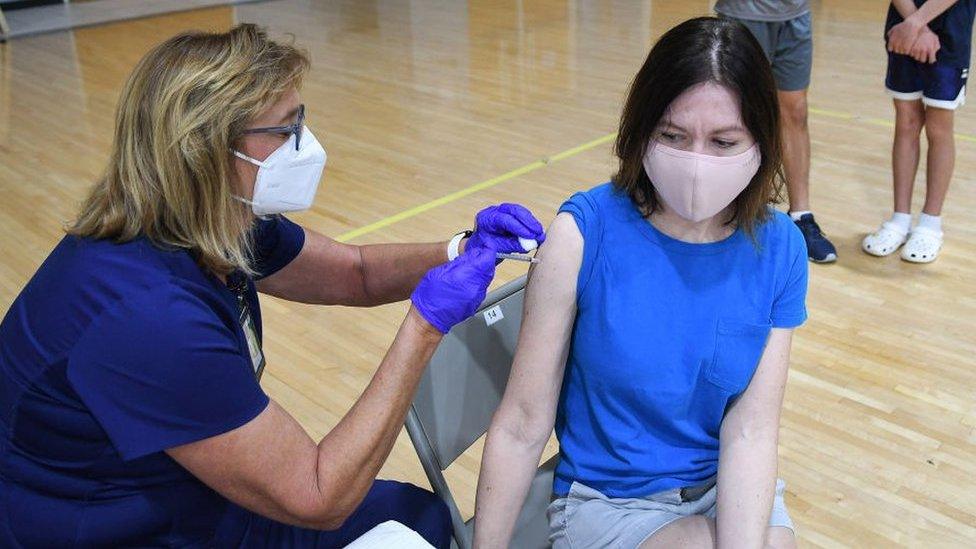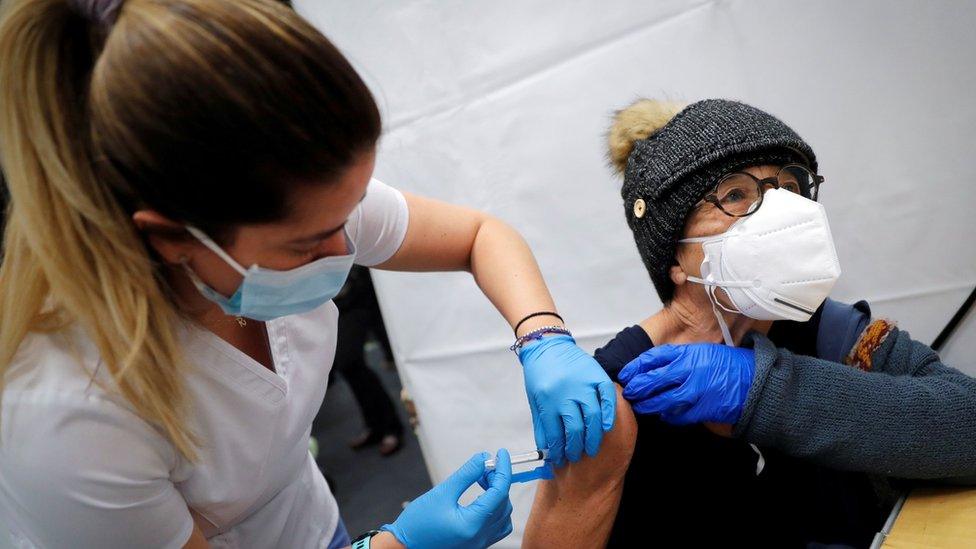Covid-19: US FDA recommends booster jabs for over 65s
- Published

A panel advising the US Food and Drug Administration (FDA) has recommended boosters of Pfizer's Covid-19 vaccine for people 65 and over, and those at high risk.
But it voted against recommending a shot for everyone aged 16 and over.
The outcome is a blow for President Joe Biden, who said widespread jabs would be available by next week if approved.
The FDA's scientific advisory committee voted 16 to 3 against the boosters for those aged 16 and over.
Many of the panel's independent experts - including infectious disease specialists - said scientific data suggested a widespread roll-out of vaccines was not warranted.
What was the argument against booster shots?
Ahead of a meeting on Friday, some scientists said they believed that boosters were unlikely to have a significant impact on the course of the pandemic.
Dr Monica Gandhi, an infectious diseases physician and professor at the University of California San Francisco, said she was not convinced by the immunology research.
"Antibodies do come down over time, but [the human body] has the blueprint to make more," she told the BBC.
These blueprints come in the form of "memory B" cells which form part of the adaptive immune system. "There's been paper after paper that shows good circulating memory B cells after the second dose," Dr Gandhi said.
Some have also said that additional vaccine doses would be more useful if distributed to parts of the world where many people have yet to receive their first or second jabs.
"If you take away the moral and ethical questions, there's still the public health question of where the next variant is going to come from," she said. "It's likely to come from places with low vaccination rates."
Why might people need an extra jab?
Advocates of the booster point to data that shows the Pfizer vaccine's effectiveness against Covid-19 falls from 96% to 84% after four months. Pfizer says that a third shot brings its effectiveness back up to 95% - including against the fast spreading Delta variant.
Dr Priscilla Hanudel, a Los Angeles-based emergency doctor, said that immunocompromised people "definitely" need to get a booster.
She said she also believes that the general public would benefit from boosters, even if they remain well protected from severe illness after the second shot.
"Just like with any vaccine, all immunity will wane over time, and in the next month we're going to be seeing that," Dr Hanudel said. "If not enough people are vaccinated and the pandemic continues, then everyone will need their immunity boost eventually, as with other vaccines," she said.
What had Biden promised?
Last month, President Biden announced that the booster shots for the Pfizer vaccine would be available on 20 September, as long as they received approval from the FDA and from the Centers for Disease Control and Prevention (CDC).
The White House had said that US residents would be eligible for booster shots eight months after receiving a second dose. Under that timeline as many as 5.2 million people may have been eligible from next week.
Are America's unvaccinated changing their minds?
Boosters shots have already been approved for those with impaired immune systems. According to CDC data, nearly 2 million people have already received a third vaccine dose since mid-August.The White House has yet to comment on the committee's recommendation, and it's unclear what happens next.
Which countries do allow booster shots?
In the UK, the government has announced that it will offer boosters to everyone over 50 and to other vulnerable people as it heads towards the winter months.
Germany, France and the Czech Republic have announced similar plans for older or vulnerable people. In Israel, boosters are already being offered to people as young as 12.
The World Health Organization has called on wealthier nations to hold off on providing booster shots until vaccination rates go up in lesser developed countries.
"There are countries with less than 2% vaccination coverage, most of them in Africa, who are not even getting their first and second dose," WHO Director-General Tedros Adhanom Ghebreyesus said earlier this week. "And starting with boosters, especially giving it to healthy populations, is really not right."
Related topics
- Published10 September 2021
